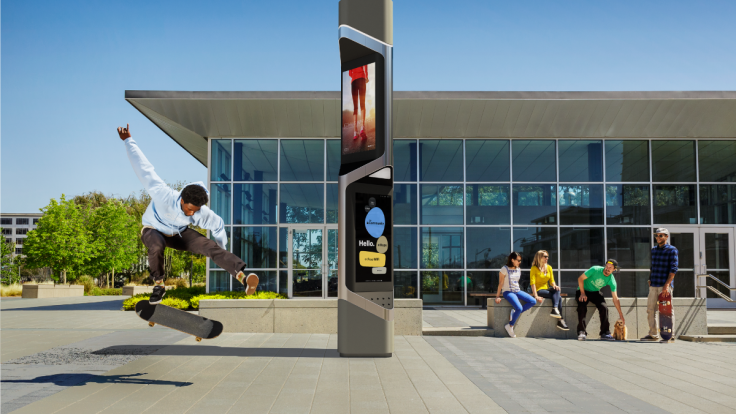Verizon Buys LQD WiFi, Expanding IoT Business with Interactive Kiosk Palo

Verizon is expanding its IoT business by purchasing LQD WiFi, which comes with a network of outdoor, interactive kiosks that offer free Wi-Fi.
All assets of LQD WiFi, a private company in New York, were bought by Verizon, the company announced Monday. The terms of the transaction have not been disclosed.
“This transaction uniquely positions us to utilize our unmatched infrastructure, platforms and network at scale to deploy elegant and engaging community technology hubs that connect, inform, inspire and support people where they live, work and play." said Mike Lanman, senior vice president, Enterprise Products and Internet of Things at Verizon.
LQD’s main feature is Palo, the street-smart kiosks that provide free Wi-Fi, local community information for the public, as well as public safety and transit announcements. Palo also provides security cameras, emergency calling and area lighting.
"Palo's human-scale touch screen lets users explore and connect with the local community creating multiple ways to engage, through an innovative, purposeful and curated experience," said LQD Founder and CEO Randy Ramusack in a statement.
He added that LQD is “thrilled” to join Verizon.
"Verizon's expertise, global scale, and leading media platforms will enable us to deliver on our mission to provide an unbounded flow of information to all people. By bringing Palo to the streets, we're connecting cities to their citizens, citizens to their neighborhoods, and enhancing communities across the country," added Ramusack, who previously worked for Microsoft.
The kiosks could provide help to those don’t have web-access. A third of U.S. adults do not have high-speed internet at home.
Verizon, which generated about $132 billion in revenues in 2015, says its goal is to address needs from the community with LQD’s technology by promoting economic development, bridging the digital divide, facilitating transportation and traffic management and increasing personal security and urban planning.
LQD and Verizon are now designing “solutions for municipalities, private developers, academic institutions and entertainment venues,” the company announced.
Although it was not confirmed in the announcement, it seems like the New Rochelle area in New York will test the Palo kiosks in their community.
"These attractive kiosks will invite residents and visitors to engage with our city, for everything from parks, cultural events and local businesses, to job opportunities and emergency messaging, and they will connect with the world around them through high-speed public Wi-Fi," said New Rochelle City Manager Charles B. Strome III.
Also in New York is Link NYC, which is similar to Palo. Link NYC launched earlier this year and vows to replace almost 8,000 pay phones across the five boroughs over the next eight years with new kiosks called Links. The spots offer Wi-Fi, phone calls, allows people to charge their phones and provides city services, maps and directions.
Hello Brooklyn! Connect to free high-speed Wi-Fi and digital services now available in Bedford-Stuyvesant area. #LinkNYC #Brooklyn #BedStuy pic.twitter.com/HBgXy8roSJ
— LinkNYC (@LinkNYC) November 8, 2016
While Links aided users, the spots also brought some trouble. Some people stayed at the kiosk too long and prevented others from being able to use them, while Link tablets were used inappropriately, annoying residents and businesses nearby. Link NYC eventually ended up removing the web browsing on all Link tablets, it announced in September. Link NYC said it was looking into other solutions, like time limits.
Link NYC was launched by the city of New York and is funded through advertising.
© Copyright IBTimes 2024. All rights reserved.





















